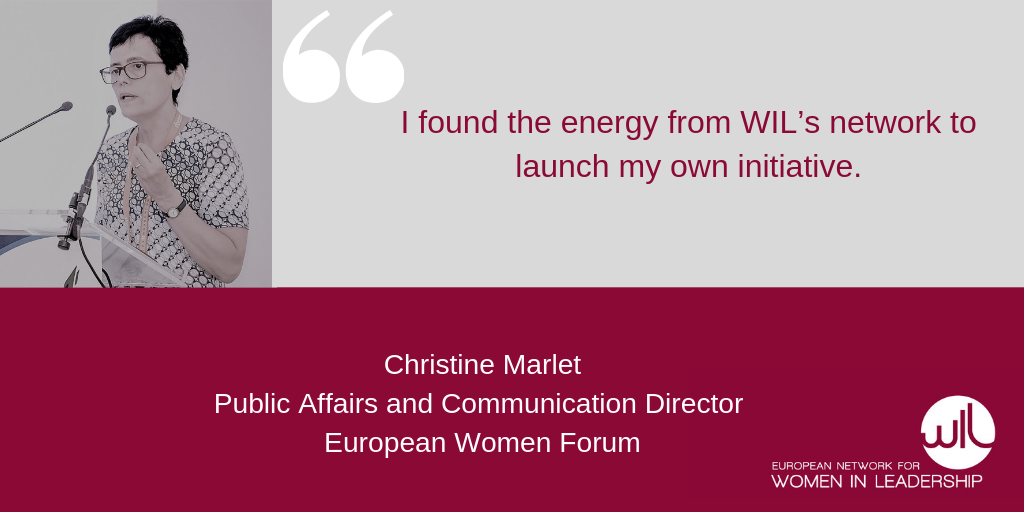
Our member Christine Marlet has been working on an initiative regarding the potential of transforming the European Women Forum into a multidisciplinary think tank, with the aim of fostering research and allowing experts to develop new models, tools and methods based on common hypotheses, shared languages and expanded conceptions, which are not possible, or are difficult to achieve, “if each remains within their original area of competence”. Read our interview to learn more about this initiative!
Since 2018, you are the EU Public Affairs and Communications Director of the European Women Forum. Could you tell us more about this organization and how you got involved in women’s issues?
The Board of the European Women Forum in March felt that the forthcoming challenges of the modern society for women needed to be tackled in an innovative way and asked me to shape a new strategy, a vision, mission, and action plan. I accepted the challenge.
I thus started to network and feel how men and women were responding to the idea of establishing a multidisciplinary think-tank for women in a society in transition. In addition, as the idea is ambitious, I have launched a consultation within the network to assess the viability of such a concept.
The Board felt that the forthcoming challenges
of the modern society for women needed to be tackled
in an innovative way. They asked me to shape a new strategy,
a vision, mission, and action plan.
I accepted the challenge.
Why do you believe a multidisciplinary approach has become necessary and how will this think tank contribute to the advancement of women in society?
Networks and associations for women empowerment in different fields and sectors are essential. However, these organizations do not have a transversal and holistic approach on what it means to be a woman.
Engaging in a multidisciplinary approach in academic research would allow us to increase awareness about gender biases and stereotypes among both women and men. It would also allow us to address the concept of femininity/masculinity and complementarity between men and women, as well as the major role of culture in gender issues and the relationship between work and productivity.
Multidisciplinarity is important as it means openness to different theoretical, conceptual and, of course, ideological premises. This does not mean that the approach should be eclectic or relativistic: the researcher will have his own hypotheses and assumptions, but he/she should also be open to the arguments made by those who do not think alike.
Engaging in a multidisciplinary approach in academic research would allow us to increase awareness about gender biases and stereotypes among both women and men.
One of the main pillars of this think tank aims at identifying best practices and initiatives which can inspire women and men around the world. Based on your experience, could you share with us some good practices concerning work-life balance solutions and the enhancement of women as role models?
One initiative that I came across thanks to the European Network for Women in Leadership is the film “Dream Girl”, empowering women entrepreneurship with the complicity of partners.
Another initiative in the field of women leadership and empowerment is “Brussels Binder”: under the slogan “No Women No Panel”, that we can also find at the international level through “The GlobalWIN conference”. On YouTube, you also have the channel “Femmes et Pouvoir” that focuses on women leadership.
In the field of work-life balance, I could mention “MAAM, maternity as a master”, which is a digital program that companies buy to transform the parental experience of their employees into an opportunity to develop soft skills that are key for productivity and success.
In the audiovisual field, there are many important films, like “Pentagone Paper” or “Hidden Figures”, that serve as role models. You have books like “Hear me Roar” from Liz Grzyb.
You are a member of the European Network for Women in Leadership. In your opinion, are women’s networks playing an important role and why?
Being part of WIL was essential as it allowed me to find the right events and right people to speak to, and the right place for exchanging ideas. Somehow, I found the energy from the network to launch my own initiative.
I found the energy from WIL’s network
to launch my own initiative.
To learn more about
Christine, have a look at her
biography!